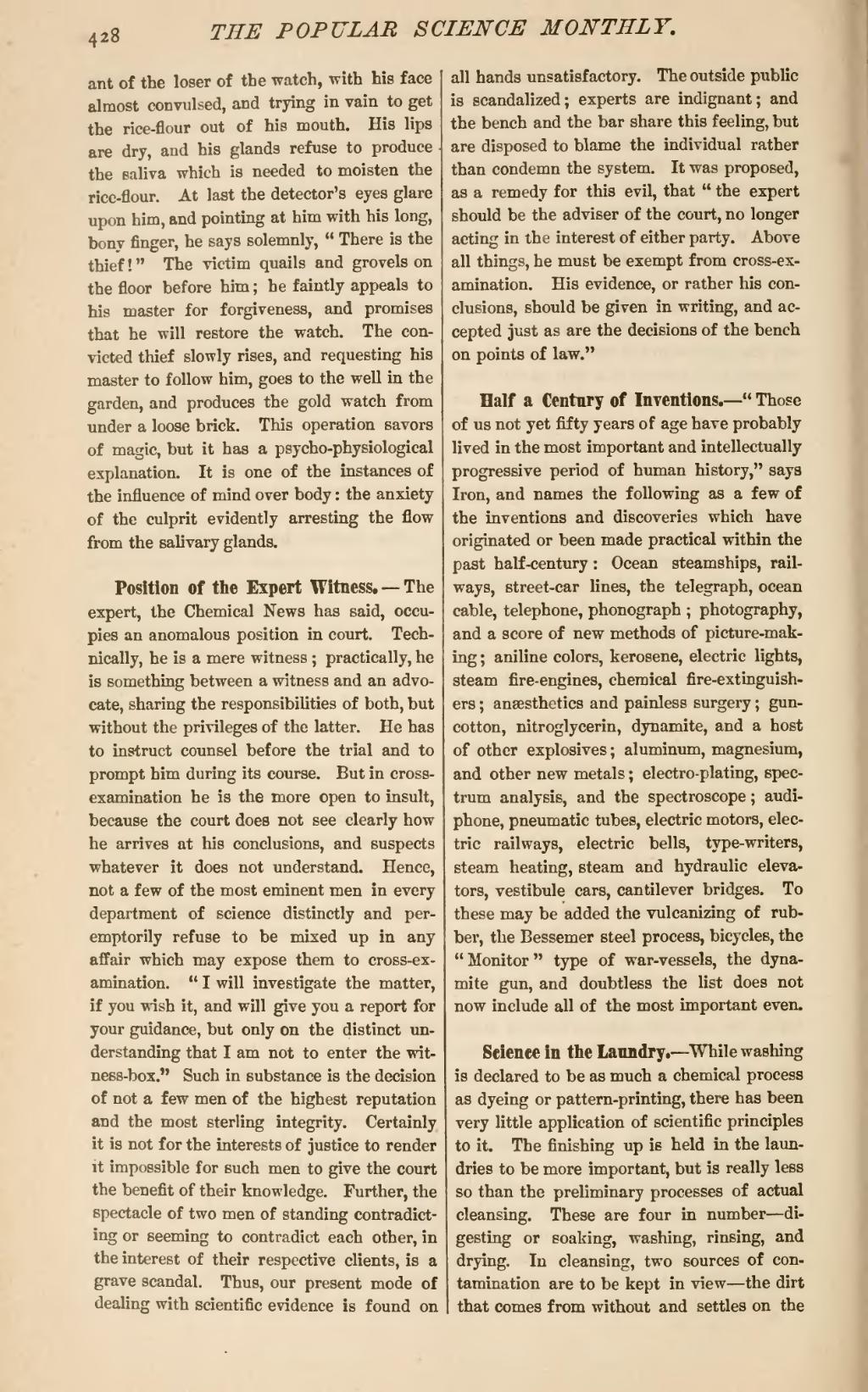ant of the loser of the watch, with his face almost convulsed, and trying in vain to get the rice-flour out of his mouth. His lips are dry, and his glands refuse to produce the saliva which is needed to moisten the rice-flour. At last the detector's eyes glare upon him, and pointing at him with his long, bony finger, he says solemnly, "There is the thief!" The victim quails and grovels on the floor before him; he faintly appeals to his master for forgiveness, and promises that he will restore the watch. The convicted thief slowly rises, and requesting his master to follow him, goes to the well in the garden, and produces the gold watch from under a loose brick. This operation savors of magic, but it has a psycho-physiological explanation. It is one of the instances of the influence of mind over body: the anxiety of the culprit evidently arresting the flow from the salivary glands.
Position of the Expert Witness.—The expert, the Chemical News has said, occupies an anomalous position in court. Technically, he is a mere witness; practically, he is something between a witness and an advocate, sharing the responsibilities of both, but without the privileges of the latter. He has to instruct counsel before the trial and to prompt him during its course. But in cross-examination he is the more open to insult, because the court does not see clearly how he arrives at his conclusions, and suspects whatever it does not understand. Hence, not a few of the most eminent men in every department of science distinctly and peremptorily refuse to be mixed up in any affair which may expose them to cross-examination. "I will investigate the matter, if you wish it, and will give you a report for your guidance, but only on the distinct understanding that I am not to enter the witness-box." Such in substance is the decision of not a few men of the highest reputation and the most sterling integrity. Certainly it is not for the interests of justice to render it impossible for such men to give the court the benefit of their knowledge. Further, the spectacle of two men of standing contradicting or seeming to contradict each other, in the interest of their respective clients, is a grave scandal. Thus, our present mode of dealing with scientific evidence is found on all hands unsatisfactory. The outside public is scandalized; experts are indignant; and the bench and the bar share this feeling, but are disposed to blame the individual rather than condemn the system. It was proposed, as a remedy for this evil, that "the expert should be the adviser of the court, no longer acting in the interest of either party. Above all things, he must be exempt from cross-examination. His evidence, or rather his conclusions, should be given in writing, and accepted just as are the decisions of the bench on points of law."
Half a Century of Inventions.—"Those of us not yet fifty years of age have probably lived in the most important and intellectually progressive period of human history," says Iron, and names the following as a few of the inventions and discoveries which have originated or been made practical within the past half-century: Ocean steamships, railways, street-car lines, the telegraph, ocean cable, telephone, phonograph; photography, and a score of new methods of picture-making; aniline colors, kerosene, electric lights, steam fire-engines, chemical fire-extinguishers; anæsthetics and painless surgery; gun-cotton, nitroglycerin, dynamite, and a host of other explosives; aluminum, magnesium, and other new metals; electro-plating, spectrum analysis, and the spectroscope; audiphone, pneumatic tubes, electric motors, electric railways, electric bells, type-writers, steam heating, steam and hydraulic elevators, vestibule cars, cantilever bridges. To these may be added the vulcanizing of rubber, the Bessemer steel process, bicycles, the "Monitor" type of war-vessels, the dynamite gun, and doubtless the list does not now include all of the most important even.
Science in the Laundry.—While washing is declared to be as much a chemical process as dyeing or pattern-printing, there has been very little application of scientific principles to it. The finishing up is held in the laundries to be more important, but is really less so than the preliminary processes of actual cleansing. These are four in number—digesting or soaking, washing, rinsing, and drying. In cleansing, two sources of contamination are to be kept in view—the dirt that comes from without and settles on the
